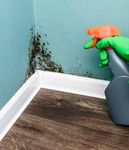Keeping your home free from damp and mould - NCHA
←
→
Page content transcription
If your browser does not render page correctly, please read the page content below
Condensation Reducing condensation
There’s always moisture in the air in your home even if you When cooking food in saucepans always cover
can’t see it. them with a lid to prevent excess moisture
escaping into the air.
If the air becomes too cold or you create too much moisture
(from cooking, bathing etc.) condensation will appear. Where you can, dry your clothes outside. In colder
or wetter weather try not to dry clothes directly on
Condensation tends to form in cold areas or areas of
radiators as this can cause excess moisture. Drying
little air movement in your home. This includes areas such
clothes on a standing airer in one damp free room
as, windows, patio doors, corners of rooms and behind
and opening the window will reduce the moisture
furniture that’s pushed against walls.
in your home. If you plan to buy a tumble dryer, use
Condensation is the main cause of damp and mould in an external vented one.
homes. If it appears on windows or doors wipe it dry
immediately to prevent mould forming. Follow the rest of Using a dehumidifier
the advice in this guide to reduce condensation. A dehumidifier is an electronic device that
works by extracting the excess moisture
you cannot see. It captures it in a
container as water, which can
then be emptied down
the drain.
Dehumidifiers can be
purchased at most
high street retailers.
2| 3|Heating your home to
Ventilating your home
reduce condensation
The ideal temperature for a home is between 18oC
and 21oC to minimise the risk of damp.
Our tips for ventilating
your home to reduce In cold weather it’s best to keep all rooms on low
excess moisture: background heating all day even when nobody’s in,
to stop condensation forming.
• Open the window trickle vents when Insulating a loft is a great way of keeping your
you can, especially if you’re cooking, home much warmer whilst lowering your heating
bathing or drying clothes. While bills. We’ll check the insulation in your home during
you’re cooking or bathing shut the a stock condition survey and increase it if required.
door to prevent condensation
forming in the rest of your home. Try not to put furniture in front of radiators or
leave a small gap in between them. This will help
• If you’ve got an extractor fan in your heat to circulate in your home rather than it being
kitchen or bathroom, use it to remove absorbed by furniture.
excess moisture from the air.
• If you have ventilation bricks or vents
in your home never cover these up.
• Try not to overfill cupboards or
wardrobes, so that air can move
through your items. If you can, drill
small ventilation holes in the back
of the furniture to prevent mould and
condensation forming within.
4| 5|Other causes of damp
Dealing with mould
in your home
If your home already has mould caused by Condensation is not the only cause of damp.
condensation, it’s a good idea to treat the mould It can also come from:
first. After this, focus on dealing with reducing
condensation in your home. This should stop the • Leaking pipes, waste or overflows
mould from reappearing.
• Rain seeping through a damaged roof
To kill and remove mould wipe down the mould or guttering
on the walls and window frames with mould
cleaner. We recommend HG Mould Remover. • Damp due to damaged brickwork.
Wash and dry any mouldy clothes or fabrics and
shampoo carpets.
Do not brush away mould, as it will move the
spores around. Instead, use a vacuum cleaner.
After treating, use anti-mould paint on the area.
Do not put ordinary paint or wallpaper on top If you have damp and mould on
of the mould paint. your ceilings, near pipework or
along the top of your skirting
board, one of these issues
may be the cause.
Call our Property Services
team on
0800 317 861
to book an inspection.
6| 7|Contacting us
If you’ve still got a query after reading this booklet, feel free
to get in touch with us.
You can contact us using the details below:
0800 317 861
repairs@ncha.org.uk
www.ncha.org.uk
Nottingham Community Housing Association
Limited is a charitable community benefit
society, registered with the Financial Conduct
Authority under number 7104.
Published May 2021
#472You can also read

























































